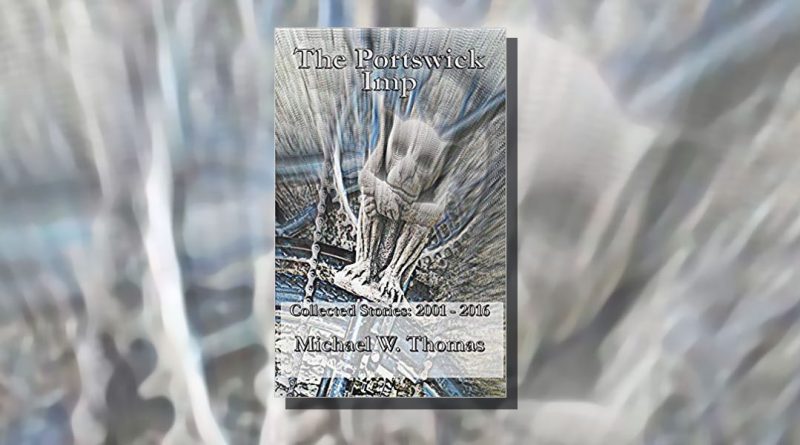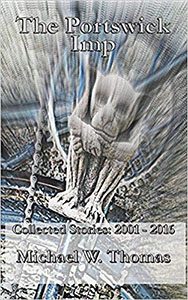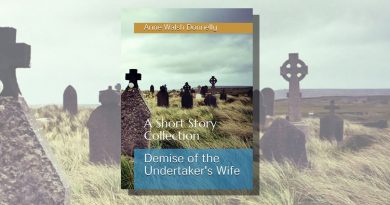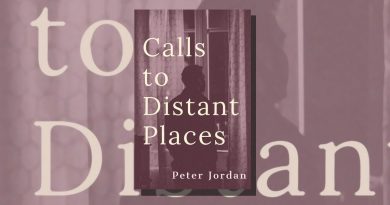The Portswick Imp Collected Stories: 2001 – 2016 by Michael W. Thomas
-Reviewed by Sally Shaw-
The Portswick Imp (Black Pear Press), is a collection of fifteen short stories by internationally known fiction-writer, dramatist and poet Michael W. Thomas. The collection is placed predominantly in the 1960s/70s. The writing evokes the atmosphere of this era with Thomas’s filmic language.
‘Strawberries And Frightened Water’ is the first story in the collection. It’s the end of term assembly at an all girls school. The teachers are sat on the stage behind the speaker and headmistress.
“It was hot. Everyone agreed that the stage got smaller every year. Suggestions were rife: get a few fans up there, arrange the chairs differently, let some staff sit at the back of the hall. But nothing changed. A particular Friday in July impelled sixty-odd bodies to meld in sufferance, becoming a beast which sighed from its many mouths, rubbed its weary legs.”
Where Jane Pearson, Rhoda Willesley and Eleanor Laird are seated on the stage provokes them to reconsider their positions. Thomas manages to write from each of the female characters’ point of view.
“On the back row of the stage, Jane Pearson studied the nape of Matthew Tate’s neck.”
“At the front of the stage, the speaker was now lurching about jiggling an official report in the air as though it were a bone to entice an origami dog. Several people were laughing. Make them stop, thought Rhoda Willersley—please. The man’s a buffoon.”
“Just behind Rhoda Willersley, Eleanor Laird was all alarm. What was the man doing? Inviting the entire stage to scrum down with him? Gearing up for a cringeworthy pirouette? But then he called a name, and Tom Howsell sprang up at the end of her row.”
Each female character has things they must confront—Jane’s is her affair with Matthew, Rhoda’s is her problem with wine and the Huskissons—the parents from hell. Eleanor witnesses Tom Howsell with an upper sixth blonde and is threatened by newbie librarian Polly.
Thomas managed to make me see how ridiculous and pretentious the end of term event is and yet it is just this that forces the characters to understand themselves.
In ‘Misshapes From Cadbury’s’ the protagonist has been in England one month moving from Grenada. His knowledge of his new home gained from guides, grammar-books and his Uncle Padmore. So, when he is left with a parcel that is inscribed with an unfamiliar address and addressee he must deliver it.
“the post had never featured Amy Forthergill. But there she was, inscribed on a soft, bulky parcel which fell against my feet as I opened the door. I ran to the pavement. The postman was just emerging two doors down. I tried ‘Excuse me,’ ‘I’m sorry’ and ‘This isn’t mine,’ but my words only pushed him into one of the alleys that criss-crossed the neighbourhood: time warps, perhaps, for public servants with a cold day and a dog-infested route before them.”
He tries to understand the address, seeks help from Harold and Thelma from next door. “’Here.’ Harold inscribed a neat cross on Amy Fothergill’s street. ‘Take a flask, he winked.”
The search for Amy’s street is hampered by the fog but eventually he is knocking on her front door. He expects she will not accept him, be scared and consider him in the wrong because he sounds and looks different. Thomas demonstrates the difficulties of individuals coming to England from the Caribbean but also their strength and willingness to learn and share cultures.
“I knocked for a longish while. At last a form appeared behind the door’s patterned glass, its head perhaps level with my chest. I heard the word ‘who?’, then something I didn’t catch, then ‘who?’ again. A face appeared above the baleful card at the window, eyes wide, cheeks wobbling like the gills of a harried fish. I imagined a cry, her hand on the phone, a posse of neighbours. Smiling foolishly, I held the parcel against the window, my finger pointing to the address like a ‘You Are Here’ symbol on the map that had served me so faithfully.”
The parcel contents belonged to Maureen Day—a friend of Amy Fothergill. She shares their stories. And along with the stories trust, acceptance, life experience, a friendship and an unexpected act of kindness. This story is beautiful. Thomas doesn’t mention the age of Amy or what she looks like yet I clearly see her in the richness of his writing.
“The chair starts to disappear—the seat, the worn flowers across the back. She lowers herself with the careful management of two sticks, whose handles fall against her shoulders when she’s done.”
I felt the emotions of the characters and I was reading the last pages through tears. There will be misshapes wherever you go—but you will find a shape to match it.
Looking up at the stars in ‘Catching The Light’ gives Martin Finch hope. His daughter Sarah has asked him to buy “Something to set among the candles.” Martin goes into the only shop in Harbours Hill. The shop is filled with oddities including storm-lamps and a brooch. It becomes clear that Harbours Hill and the rest of Britain is in decline and people no longer have autonomy. Two stations on the radio, one station plays archives and the other—“station, possibly live, was devoted to Brains Trust-style debates, bulletins about the state of the nation and updates on efforts to get it back on track.” There are security-hubs and wellbeing hubs, compulsory set ups as society is re-ordered. Martin has more than what to buy his daughter and the current ‘situation’ to worry about.
The Portswick Imp for me was both a pleasure and a challenge to read inasmuch as I grew up in the 1970’s but I am not an academic. Thomas’s writing is engaging and beautiful but it is also clever. I had to look some terms up and re-read several of the stories.
Other highlights include ‘My Mother’s Major’, ‘One is One’, ‘Delfigo Street,’ and title story ‘The Portswick Imp’—but I will leave you to discover these by yourself.
Find out more about The Portswick Imp on the Black Pear Press website.

Reviewed by Sally Shaw — Sally has an MA Creative Writing from the University of Leicester. She writes short stories and poetry. She gains inspiration from old photographs, history, and she is inspired by writers Sandra Cisneros, Deborah Morgan and Liz Berry. Her short prose has been published by NEWMAG, Ink Pantry, and Comma Press, and her poetry by AnotherNorth. In 2019 she was longlisted for the Sunderland Short Story Award. She writes reviews for Sabotage and Everybody’s Reviewing. Originally from the North West, Sally worked as a nurse for 33 years and now lives in Warwickshire with her partner and three pekin bantams.
Twitter: @SallySh24367017 | Blog: SallyShaw88.wixsite.com





